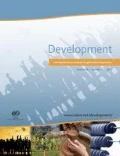Abstract
In Latin America, particularly after the failure and subsequent questioning and delegitimizing of neo-liberal politics that has taken place since the beginnings of the 2000s, the search for new paths is evident, within social movements and political forces. Without disregarding the centrality of orthodox economic politics, a new construction of ideas is emerging in the periphery, not without weaknesses and contradictions. Feminist proposals share much of this questioning and include a gender perspective that cross-cut the analysis of families, social environment and macro policies. The IDeA team share the ongoing dialogue among feminists in the region in the following five contributions that contributing to fertile ground to challenge the hierarchical and unequal gender order.
Similar content being viewed by others
Notes
See Secretaría Nacional de Planificación y Desarrollo: Plan Nacional para el Buen Vivir 2009–2013, http://plan.senplades.gov.ec/inicio.
Bolivian Constitution, available at http://www.presidencia.gob.bo/download/constitucion.pdf.
In 2010, the Parliament enacted Law 22618, which stipulates that ‘marriage has the same requirements and effects, whether the contracting parties are of the same or opposite sexes’.
Law N° 18.065 on Domestic Work from 2006.
It is the case of Costa Rica and Uruguay.
In Uruguay, Law N° 18.640 from 2010 created the Ceibal Support Center for Child and Youth Education with the aim to promote digital inclusion for broader and better access to education and culture and the integrated use of a notebook computer per student to sustain teaching activities in classrooms and school centres. In Argentina, Decree 416/10 created the Connecting Equality Programme with the purpose of distributing 3 million netbooks in public secondary schools and teacher training centres in 2010–2012 and offering capacity building for teachers with the goal to transform paradigms and learning and teaching processes. Similar proposals are stated in the Canaima Education Project of Venezuela (http://www.canaimaeducativo.gob.ve).
The Constitution of the Bolivarian Republic of Venezuela (1999) acknowledges domestic work as an economic activity that produces added value, richness and social well-being. Also, it includes the right of every person – specifically including homemakers – to social security ‘as a public service of non-profit character to guarantee health care and secure protection in case of maternity’. In addition to acknowledging the unpaid work women do, it refers to the need to take it into account in national finances.
Bolivian Constitution, Article 338, http://www.presidencia.gob.bo/download/constitucion.pdf.
Summary by Rochelle Jones of the original paper by Pamela Caro, http://awid.org/Library/Feminist-Perspectives-Towards-Transforming-Economic-Power-Topic-1-Food-Sovereignty.
Summary of the original paper by Rochelle Jones. Read the complete article in www.awid.org.
During decades of presence in the international agenda, the concept of development has undergone several levels of criticism, resistance and reformulations. An expression of this has been the numerous names and multiple combinations that have been formulated: development with a human face, development with equity, human development, sustainable development, etc. From a more rupturist perspective, the visions of maldevelopment, postdevelopment and degrowth stand out.
In both cases, much has been elaborated on the intersections of development/globalization/women-gender.
There is an unprecedented revaluation of feminism, in some cases being called ‘feminist socialism’.
Almost all native peoples of the American continent have concepts similar to Buen Vivir, and these concepts are part of the heritage and the practices of peoples all over the world.
References
Caro, Pamela (2011) ‘Soberanía Alimentaria: aproximaciones a un debate sobre alternativas de desarrollo y derechos de las mujeres’, AWID, http://awid.org/esl/Library/Perspectivas-Feministas-Hacia-la-Transformacion-del-Poder-Economico-Soberania-Alimentaria, accessed June 2012.
Choque, Maria Eugenia (2010) ‘Personal interview with the author’, 1 September.
CLOC–La Vía Campesina (2010) ‘School of Women, Southern Cone’, Training Newsletter, March.
Constitución Política del Estado Plurinacional de Bolivia (2009) ‘Preámbulo’, Versión Oficial.
ECLAC (2010a) ‘La hora de la igualdad: brechas por cerrar, caminos por abrir’, 2011, http://www.eclac.org/publicaciones/xml/0/39710/100604_2010-114-SES.33-3_La_hora_de_la_igualdad_doc_completo.pdf, accessed June 2012.
ECLAC (2010b) ‘Qué estado para qué igualdad’, XI Regional Conference on Women in Latin American and the Caribbean, Brasilia, 13–16 July 2010. ECLAC – Secretaria de Políticas para as Mulheres (Brasil). Santiago de Chile.
Espino, Alma (2012) ‘La dimensión de género de la crisis’, Nueva Sociedad N° 237 (In press) Fundación Friedrich Ebert (FES). Buenos Aires, http://www.nuso.org/upload/articulos/3821_1.pdf, accessed June 2012.
Huanacuni, Fernando (2010) ‘Vivir Bien-Buen Vivir: Filosofía, políticas, estrategias y experiencia regionales’, La Paz: (Convenio Andrés Bello y el Instituto Internacional Integración).
La Vía Campesina (2009) ‘Declaration of Rights of Peasant Men and Women’, March, http://viacampesina.net/downloads/PDF/EN-3.pdf, accessed June 2012.
León, Irene (2008) ‘Managing of Food Sovereignty’, 22 February, Web June 2011, http://www.fedaeps.org, accessed June 2012.
León, Irene and Lidia Serna (2007) ‘Approximation to the Situations of Peasant Women and Their Proposals to Achieve Equality of Rights between Men and Women in the Context of the Struggle for Food Sovereignty’, Study conducted for Entrepueblos.
León, Magdalena (2005) ‘Globalization and Free Trade: An approach from a feminist perspective’, in Irene León (ed.) Women in Resistance, Experiences, Visions and Proposals, Quito: Latin-American Information Agency.
Montecinos, Camila (2010) ‘GRAIN’, Personal interview, August.
Nobre, Miriam (2009) ‘Los alcances transformadores de la soberanía alimentaria’, August, http://www.fedaeps.org/alternativas/los-alcances-transformadores-de-la, accessed June 2012.
Norgaard, Richard B. and Thomas O. Sikor (1995) ‘The Methodology and Practice of Agroecology’, in Miguel A. Altieri (ed.) Agroecology, the Science of Sustainable Agriculture second edition, pp 53–62, Colorado: Westminster Press.
Rodríguez, Francisca activist (n.d.) Personal interview.
Additional information
Gives a detailed analysis of the many emerging alternative actions and policies in Latin America
Rights and permissions
About this article
Cite this article
Espino, I., Sanchís, N., Caro, P. et al. Alternatives under Construction in Latin America. Development 55, 338–351 (2012). https://doi.org/10.1057/dev.2012.39
Published:
Issue Date:
DOI: https://doi.org/10.1057/dev.2012.39



